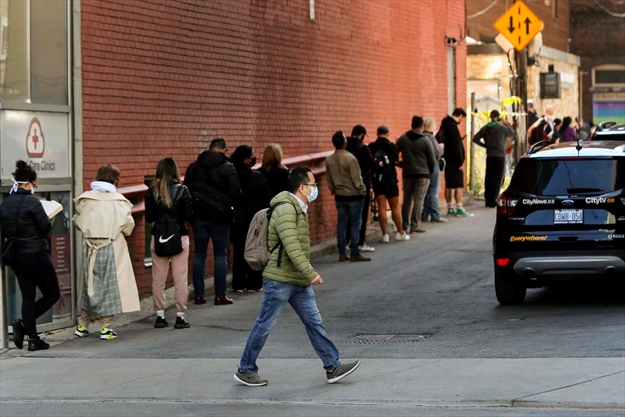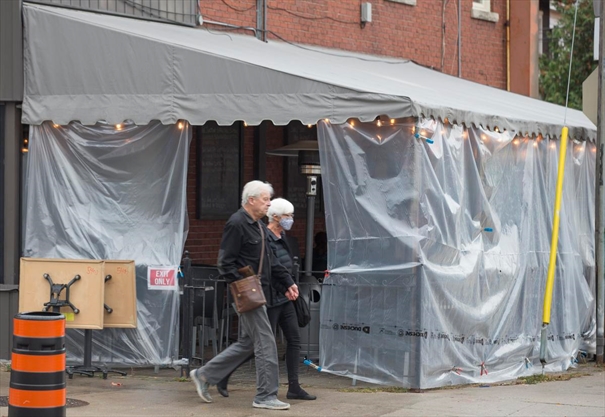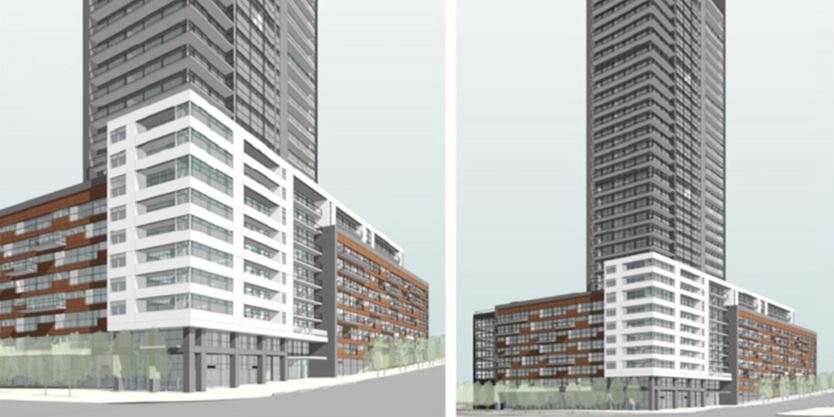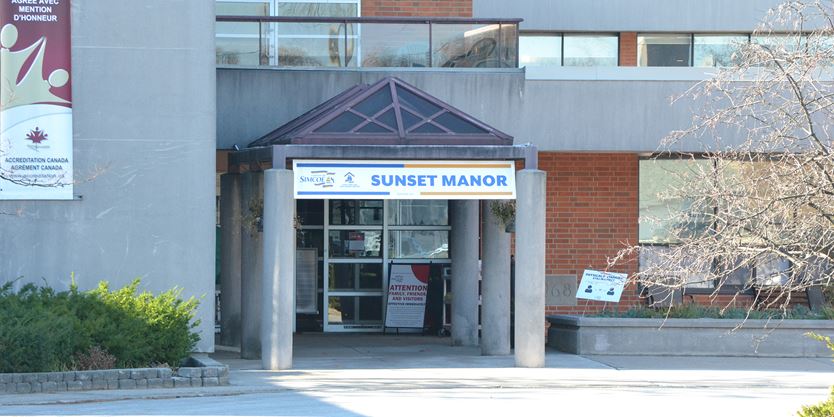The latest news from Canada and around the world Wednesday. This file will be updated throughout the day. Web links to longer stories if available.
10:32 p.m. South Korea has 121 new confirmed cases of the coronavirus, its first triple-digit daily jump in a week amid concerns about the country easing social distancing restrictions just last week to cope with a weak economy.
The Korea Disease Control and Prevention Agency said Thursday that South Korea’s caseload is now at 25,543 for the pandemic, including 453 deaths.

Hundreds of recent infections have been tied to hospitals in major cities such as Seoul and Busan. Officials are testing 130,000 workers at hospitals, nursing homes and senior facilities in the Seoul metropolitan area hoping to reduce outbreaks.
South Korea has enforced its lowest level of social distancing measures since Oct. 13, allowing high-risk businesses and karaoke bars to reopen and fans to return to professional sports.
9:30 p.m. Mexican health officials estimated Wednesday that the country has risen above one million coronavirus cases, though the figure includes both confirmed infections as well as suspected cases.
Officials put the country’s apparent deaths from COVID-19 at 102,293, again including cases in which patients were not tested for the virus.
The Health Department says its pandemic caseload tally has reached 1,005,938. That includes people who have displayed symptoms of COVID-19 but were not given tests or whose samples could not be processed. Test-confirmed cases total 867,559.
The agency attributes 102,293 deaths to the pandemic, adding in deceased patients who weren’t tested but had symptoms judged to be caused by COVID-19. Test-confirmed deaths stand at 87,415.
Mexico has an extremely low testing rate.
8:18 p.m.: The number of active cases of COVID-19 among residents of Ontario long-term-care homes is growing at an average rate of about eight per cent per day, prompting seniors advocates to call for measures to prevent a full-blown second wave of infections from sweeping through facilities.
There were 216 active resident infections in the province’s long-term-care homes as of Oct. 20, up from just under five on Sept. 1. That represents an average daily growth rate of 7.99 per cent between those dates. (Since the official provincial numbers for Sept. 5 indicate less than five infections, we have assumed five for ease of calculation.)
At the same time, the number of homes with active outbreaks currently sits at 86, up from 13 on Sept. 1, with a high of 87 homes reached on Oct. 19. Sixty residents have died of COVID-19 since the beginning of September.
“It shouldn’t be about the numbers. It’s the fact that this is happening again and we’re on the trajectory headed towards a déjà vu of what happened in the first wave,” said Vivian Stamatopoulos, an associate professor at Ontario Tech University and a family caregiver advocate.
“Not enough was learned and the kinds of policies and supports we needed didn’t happen. This is preventable.”
7:45 p.m.: is isolating at home after one of his cabinet ministers tested positive for COVID-19.
A spokesman for Kenney says the premier went into self-isolation after learning that Municipal Affairs Minister Tracy Allard was infected.
Deputy press secretary Harrison Fleming says Allard had been isolating since the weekend because a close contact tested positive.
He says Allard received her positive test result this afternoon and Kenney immediately went into isolation as a precaution.
Alberta is reporting 406 new cases of COVID-19 and three new deaths.
7 p.m.: The number of COVID-19 infections in Toronto, the rate of infection and the number of people being hospitalized continues to climb, Toronto’s medical officer of health announced Wednesday, striking an unusually sombre note at the afternoon update from city hall.
Dr. Eileen de Villa reported 346 new cases in one day, with a total of 128 people in Toronto now hospitalized, 21 more than yesterday.
The test positivity rate is also increasing: Between Oct. 4 to Oct. 10, the positivity rate was 3.2 per cent. On Wednesday, de Villa reported it climbed to 4.4 per cent between Oct. 11 and Oct. 17.
“I am concerned that its upward climb is not over, especially when I look at COVID-19’s renewed eruption in other countries,” said de Villa.
She pointed to lockdowns in Europe, including a national six-week lockdown in Ireland expected to result in 150,000 job losses; a similar two-week lockdown in Wales; regional lockdowns in parts of Spain and Italy and a nighttime curfew for four weeks in Paris and nine other cities in France.
She pointed to daily cases in the U.S., which topped 70,000 last week for the first time since July.
“There is nothing to prevent COVID-19 from catching fire here except the choices we make,” said de Villa.
6:20 p.m.: who had their WestJet and Swoop flights cancelled by the airlines as a result of the COVID-19 pandemic — the first airline to offer full refunds for all flights.
The company says the refunds will be in the original form of payment, rather than a credit for future flights as it had been previously offering.
The Calgary-based company says it will begin on Nov. 2 to contact eligible passengers, starting with those who flights were cancelled at the onset of pandemic last spring.
It asks passengers not to contact the company to avoid overloading its contact centre.
Refunds are expected to take six to nine months.
5:30 p.m.: Health Canada has issued a large recall of numerous wipes products sold in Halton region and across Canada due to a possible contamination that could cause infections.
The involves Cottonelle & Cottonelle GentlePlus Flushable Wipes products. The company reported that more than 2 million units of the affected products were sold in Canada.
“Some of the recalled products may have the presence of a common household microorganism, Pluralibacter gergoviae,” Health Canada said in a statement. “Pluralibacter gergoviae rarely causes serious infections in healthy individuals. Individuals with weakened immune systems, who suffer from a serious pre-existing condition, who have been treated surgically, or belong to another sensitive group of persons are at an increased risk of infection if they use the contaminated product.”
The affected products were sold from February 14, 2020 to October 7, 2020, Health Canada said.
As of October 7, the company has received no reports of incidents or serious injuries in Canada. The affected products were sold at many stores, including Costco.
4:30 p.m.: The Liberal government has survived a confidence vote of its own creation, after the New Democrats joined Prime Minister Justin Trudeau’s party in rejecting a Conservative attempt to create a powerful new parliamentary committee to investigate alleged corruption.
Three Green and two independent MPs — former Liberals Jody Wilson-Raybould and Marwan Tabbara — also voted against the motion. The Conservatives and Bloc Québécois supported it.
It was defeated in the House of Commons, 180 to 146, preventing for now the possibility of a snap election during the second wave of the COVID-19 pandemic this fall.
Trudeau had earlier declared the government’s intention to make the Conservative motion a confidence vote, setting up the possibility that the minority Liberals would lose power and trigger a federal election.
2:38: Dr. Eileen de Villa says 128 people are now in hospital in Toronto with COVID-19, 21 more than Tuesday. There are 346 more cases in Toronto, she reports.
2:24 p.m.: There are two certainties at Queen’s Park: A provincial budget will be tabled within the next two weeks, and that spending blueprint will be awash in red ink thanks to the COVID-19 pandemic.
Finance Minister Rod Phillips must introduce his fiscal plan before Sunday, Nov. 15.
Thanks to limitations of the legislative calendar, that means the budget can be unveiled as early as next Monday and as late as Thursday, Nov. 5. (The legislature is not sitting Nov. 9-12 due to the Remembrance Day constituency week.)
In the house on Wednesday, Phillips dropped some hints about the Progressive Conservatives’ forthcoming budget.
Under questioning from Liberal MPP Amanda Simard (Glengarry-Prescott-Russell), he indicated there would be continued support for small businesses ravaged by the pandemic.
1 p.m. As federal political parties weigh whether to vote Wednesday — on the one-year anniversary of the last one — a public opinion poll shows most Canadians wouldn’t mind if it triggered .
Abacus Data surveyed 1,000 Canadians Tuesday evening, on the eve of a crucial decision in Parliament over whether MPs should vote in favour of a Conservative proposal for a powerful committee to investigate alleged government corruption.
The poll showed 55 per cent of Canadians think MPs should create the committee even if it triggers a snap election, while 45 per cent said they should act to prevent an election.
But only a 31 per cent minority of Canadians are following it closely or had even heard of the upcoming confidence vote.
12:50 p.m. The number of new cases in public schools across the province has jumped by 144 from the previous day, to a total of 823 in the last two weeks.
, the province reported 66 more students were infected for a total of 455 in the last two weeks; since school began there have been overall total of 874.
The data shows there are 13 more staff members for a total of 113 in the last two weeks — and an overall total of 235.
The latest report also shows 65 more individuals who weren’t identified for a total of 255 in that category — and an overall total of 460.
There are 516 schools with a reported case, which the province notes is about 10.7 per cent of the 4,828 public schools in Ontario.
12:45 p.m. New Brunswick is reporting its fourth death attributed to COVID-19. Public Health said a person with underlying health conditions who was between 70 and 79 years old died today in the Campbellton region.
The province is also reporting six new cases of COVID-19, all in the Campbellton area. The cases involve a person under the age of 19 and five people between the ages of 30 and 69.
There are 92 active infections in the province, while five patients are hospitalized with the disease and one is in intensive care. Authorities say they will likely ease restrictions in the Moncton region on Friday, an area that had been under a heightened pandemic-alert level following recent COVID-19 outbreaks.
12:40 p.m. A judge has dismissed an application by homeless individuals and their advocates to allow encampments in Toronto parks during the pandemic.
The group, which includes 14 people living in encampments and two activist organizations, sought an interim order to allow the homeless individuals to stay in parks until a constitutional challenge of a city bylaw is heard.
The bylaw bans living or camping in parks after midnight.
Justice Paul Schabas says the group hasn’t met the standard of establishing harm to the public interest that would justify suspending the city’s ability to enforce its bylaw.
Schabas says suspending the bylaw would unjustifiably tie the city’s hands in dealing with encampments that raise serious health and safety concerns during the pandemic.
Hundreds of men and women have left shelters since the pandemic began and have been living in encampments that have sprouted up across the city.
12:34 p.m. The Manitoba government is increasing fines for people and businesses who ignore public health orders during the COVID-19 pandemic.
The fine for individuals will jump to $1,296 from $486, and for businesses the fine will rise to $5,000 from $2,542.
The province has already levied fines against several businesses suspected of not following capacity limits, physical distancing or other rules.
Premier Brian Pallister says the province is also working to change regulations so that municipal bylaw officers can enforce the rules.
He says, as of last week, 134 fines had been issued.
COVID-19 case numbers have jumped sharply in the province since the summer, especially in the greater Winnipeg area, where tighter restrictions have been imposed.
12:30 p.m. A COVID-19 outbreak has been declared in a unit at Scarborough Health Network’s General site.
In a memo obtained by toronto.com, the health network’s infection prevention and control department, alongside Toronto Public Health, is reporting six patients on CP4 Inpatient Medicine have tested positive for the virus. No staff have been reported as sick. The hospital is located at 3050 Lawrence Ave. E. at McCowan Road.
The unit has now been closed to admissions and visitors, according to the memo. Infection prevention and control measures, such as outbreak meetings with the unit, enhanced cleaning and ongoing monitoring and screening of patients and staff, have been put in place.
“We continue to monitor the situation closely,” a spokesperson for Scarborough Health Network said in part to toronto.com.
Scarborough Health Network is the latest Toronto health institution to report a COVID-19 outbreak during the second wave.
St. Michael’s Hospital declared a COVID-19 outbreak in their emergency department on Tuesday. St. Joseph’s Health Care Centre in the High Park area is also dealing with outbreaks in several units, and so is Toronto Western Hospital.
11:42 a.m. The European Union decided to remove Canada, Tunisia and Georgia from its list of countries whose residents should be allowed to visit the bloc amid the coronavirus pandemic, an EU official familiar with the matter told Bloomberg.
The EU also opted to reopen its borders to travellers from Singapore as a result of improved virus trends there, the official said on the condition of anonymity because the deliberations on Wednesday in Brussels were confidential. The U.S. will remain blacklisted along with most other countries.
The changes are the first in more than two months to the EU’s recommended travel “white list,” shrinking it from 11 foreign nations at present to nine. The other eight are Australia, China, Japan, New Zealand, Rwanda, South Korea, Thailand and Uruguay.
10:26 a.m. Romania hit an all-time high Wednesday with 4,848 positive coronavirus cases as authorities carried out a record number of tests.
Romania reported 37,025 coronavirus tests, the highest so far. It added 69 deaths in the last 24 hours.
The rate of infections over the past 14 days passed the threshold of three people per 1,000 in 255 localities nationwide, all of which entered the “red scenario,” according to data from Romania’s Emergency Services Department.
In the red scenario, masks are mandatory in all public venues and restaurants, cafes, theatres and cinemas are closed. Schools are shut down and switch to online learning.
Romania has reported 191,102 coronavirus cases and 6,065 confirmed deaths.
10:14 a.m. (will be updated) Ontario is reporting 790 cases of COVID-19. Locally, there are 321 new cases in Toronto, 157 in Peel, 76 in York Region and 57 in Ottawa. More than 32,600 tests were completed. York entered modified Stage 2 restrictions on Monday because of a rapid growth in cases.
10:05 a.m. Authorities in Belgium fear another deadly wave of coronavirus cases could soon hit care homes as the country confronts the risk of seeing its hospitals overwhelmed by COVID-19 patients, leading them to restrict nursing home visits.
The country of 11.5 million inhabitants recorded half of its COVID-19-related deaths in such homes during the spring wave of the pandemic. Amid a new surge in confirmed cases, new infections have been growing at an alarming rate in eldercare facilities.
In the Dutch-speaking region of Flanders, coronavirus infections in care homes have risen by 51% and the number of deaths has doubled in the past week, according to local media quoting figures by the Flemish Agency for Care and Health. And the number of deaths has doubled over the past week.
Care home employees worked during the pandemic’s earlier peak with a shortage of tests, masks and protective equipment. To avoid a repeat of the situation, nursing home visits will now be limited until the curve of the current outbreak in Belgium flattens.
10 a.m. Netflix’s subscriber growth slowed dramatically during the summer months after surging in the spring fuelled by pandemic lockdowns that corralled millions of people in their homes.
The summer slump came as more people sought distraction from the pandemic outdoors and major U.S. professional sports resumed play, offering other entertainment alternatives to the world’s most popular video streaming service.
The drop-off disclosed Tuesday in Netflix’s latest earnings report was more dramatic than management had warned it might be.
9:50 a.m. Formula One driver Lance Stroll said he intends to race at the Portuguese Grand Prix this week after finishing a period of self-isolation following a positive test for the coronavirus.
Stroll, who drives for Racing Point, pulled out of the Eifel Grand Prix at the Nürburgring a day before the Oct. 11 race because he felt unwell and said Wednesday he later tested positive for COVID-19.
In a post on Instagram, Stroll said he spent 10 days at home in self-isolation with mild symptoms and returned a negative test on Monday.
“I feel in great shape,” the Canadian driver wrote, “and I can’t wait to be back with the team and to race in Portugal.”
9:45 a.m. The curbside patios and bicycle-lane bump-outs along Danforth Ave. that drew widespread acclaim this summer are about to be packed up.
The city’s Planning and Housing Committee voted Tuesday to extend patio season in Toronto until May 2021, with the exception of patios that were set up in curb lanes.
Those must be closed in the next few weeks, to allow winter road clearance to swing into action as soon as the snow begins to fly.
“As much as we would love to leave the patios in the curb lanes, all of those patios will come out,” said Mayor John Tory, at a press conference Tuesday morning. “We have to plow the roads when it starts to snow.”
9:35 a.m. As the COVID-19 pandemic’s second wave continues to build, Ontario’s labs reported on Tuesday they had tested at less than half their full capacity to process patient samples — a shortfall that has experts questioning whether the province is still able to accurately measure the virus’s spread.
According to the province’s data, Ontario’s labs have the capacity to analyze more than 45,000 COVID-19 tests daily, just shy of the stated goal of around 50,000 daily by mid-October.
But since a move earlier this month to , the labs’ actual testing output has fallen significantly for the first time since late May. As of Tuesday, the seven-day average for lab output is about 36,000 tests daily, down from a peak of more than 43,000 as of Oct. 9; the 24,049 tests reported processed Monday were the fewest since early September.
9:30 a.m. Families and lawyers of seniors who died of COVID-19 in long-term care are outraged at proposed Ontario legislation that would make it harder to sue nursing homes for damages.
“It’s another kick-them-when-they’re down moment,” said , who filed a $1.6-million lawsuit after her father, Paul, passed away during a COVID-19 outbreak at Orchard Villa nursing home in Pickering last April.
“I’m not backing down,” Parkes said. “We are all riled up, all of us.”
Civil suits that don’t meet the threshold of gross negligence and intentional misconduct will likely be dismissed by the courts without costs, according to by Attorney General Doug Downey.
9:26 a.m. cases have been linked to a wedding in Calgary earlier this month, as Alberta’s top doctor warned the province is in the “danger zone.”
Dr. Deena Hinshaw, chief medical health officer, said 63 people attended the celebration, which was partly indoors.
“I think it’s really important to make sure that we’re not singling this particular event out as an outlier, because it’s simply an example of a kind of activity that we know causes spread if an infectious person shows up,” she said during Tuesday’s COVID-19 media briefing.
She said a common thread between the wedding outbreak and other recent ones is that one or two protective measures — whether that be hand sanitizer, masks or physical distancing — likely slipped.
“The people that were involved did nothing intentionally wrong,” said Hinshaw. “They were doing their best to follow guidance and it just reinforces that everyone that attends one of these events needs to think about all those layers of protection.”
9:11 a.m. Hong Kong airline Cathay Pacific Airways said Wednesday it would cut 8,500 jobs and shut a regional airline as it grapples with the plunge in air travel due to the pandemic.
About 5,300 employees based in Hong Kong and another 600 elsewhere will likely lose their jobs, and 2,600 unfilled positions will be cut. The cuts are about 24 per cent of the company’s workforce, Cathay Pacific said in a statement.
“The global pandemic continues to have a devastating impact on aviation and the hard truth is we must fundamentally restructure the group to survive,” Cathay Pacific CEO Augustus Tang said in a statement.
“We have to do this to protect as many jobs as possible, and meet our responsibilities to the Hong Kong aviation hub and our customers,” Tang said.
The company said it will also shut down Cathay Dragon, its regional airline unit, with operations ceasing from Wednesday.
9 a.m. Statistics Canada says retail sales rose 0.4 per cent to $53.2 billion in August.
It was the fourth consecutive monthly increase for retail sales since a record drop in April, when pandemic-related restrictions shuttered most non-essential businesses.
Economists on average had expected an increase of 1.1 per cent, according to financial data firm Refinitiv.
Sales at building material and garden equipment and supplies dealers rose 4.5 per cent, while sales at food and beverage stores climbed 0.8 per cent.
Retail sales in volume terms were up 0.5 per cent in August.
The results came as Statistics Canada says an preliminary estimate for September suggests retail sales were relatively unchanged for the month, but added that the figure will be revised.
8:40 a.m. A dispute over the scope and composition of a House of Commons committee will come to a head Wednesday in a vote that could trigger a federal election in the midst of the second deadly wave of COVID-19.
Prime Minister Justin Trudeau has declared that the vote on a Conservative motion to create a special anti-corruption committee will be test of confidence in his minority Liberal government.
The Conservatives are willing to drop “anticorruption” from the name of their proposed committee but the intent remains the same: to create a disproportionately opposition-dominated committee to investigate the WE Charity affair and other issues the official Opposition maintains reek of the government funnelling pandemic-related funding to Liberal friends.
8:37 a.m. Statistics Canada say its consumer price index in September was up 0.5 per cent compared with a year ago. The reading compared with an year-over-year increase of 0.1 per cent in August.
Economists on average had expected a year-over-year increase of 0.4 per cent, according to financial data firm Refinitiv.
8:32 a.m. A crowd of 11,388 attended Tuesday night’s World Series opener between the Los Angeles Dodgers and Tampa Bay Rays, spread in groups of up to four, mostly in alternate rows and none directly behind each other among the forest green seats.
That was the smallest crowd for the Series since 10,535 attended Game 6 in 1909 between the Tigers and Pittsburgh at Detroit’s Bennett Park, according to the Elias Sports Bureau.
Major League Baseball planned to make about 28 per cent available of the 40,518 capacity at the retractable-roof stadium of the Texas Rangers. The new $1.2 billion (U.S.) venue opened this year and replaced Globe Life Park, the team’s open-air home from 1994 through 2019.
8:30 a.m. The U.K. government’s borrowing rose to the highest level on record in the first half of the financial year as tax revenue fell and authorities spent billions of pounds to prop up an economy ravaged by the coronavirus pandemic.
The Office for National Statistics said Wednesday that the government borrowed a net 36.1 billion pounds ($47.1 billion U.S.) in September, pushing the total for the first six months of the year to 208.5 billion pounds. That’s the highest figure since records began in 1993.
Taxe revenue dropped 11.6 per cent from a year earlier in the six months through September. At the same time, support for individuals and businesses to get through the pandemic contributed to a 34 per cent increase in day-to-day spending.
Public sector net debt now stands at 103.5 per cent of the U.K.’s annual economic output, the highest level since 1960, the ONS said.
7:30 a.m. Pakistan’s military-backed National Command and Operation Center has issued a warning that another lockdown could be imposed to contain COVID-19 deaths if people don’t stop violating social distancing rules.
The announcement on Wednesday came after Pakistan reported 660 new confirmed cases in the past 24 hours and 19 single-day deaths.
The daily death toll was one of Pakistan’s highest in more than two months. Deaths from COVID-19 have steadily increased since the government lifted its months-long lockdown in August.
Pakistan has reported 324,744 confirmed cases of the virus and 6,692 virus-related deaths since February.
7:22 a.m. Poland has reported a new record for daily coronavirus cases after conducting a record number of virus tests.
The country on Wednesday reported 10,040 new confirmed cases, 13 COVID-19 deaths and 60,000 tests performed in 24 hours.
Authorities in large cities are taking steps to turn conference halls into temporary COVID-19 hospitals, and the city of Krakow is planning to reopen a disused hospital to treat coronavirus patients.
Polish lawmakers are debating legislation that would give more funds to medics and temporarily exempt them from legal responsibility for mistakes that take place while treating people for COVID-19.
The country of some 38 million has almost 203,000 total cases, including about 3,900 deaths.
6 a.m.: St. Michael’s Hospital declared a COVID-19 outbreak in their emergency department on Oct. 20.
A statement released on the hospital’s website reported five active cases amongst staff related to the outbreak with no reports in patient cases.
According to the statement, “outbreak status” refers to “two COVID-19 cases within a 14-day period, where both cases could reasonably have been acquired in hospital.”
The hospital determined that the risk of patient exposure is low, and that they will be reaching out to any patient who had direct contact with the staff who tested positive.
5:45 a.m.: Eighteen fishing crewmen who last week flew to New Zealand from Moscow have tested positive for the coronavirus, underscoring the difficulty New Zealand faces in trying to import needed workers while remaining virtually virus free.
A total of 235 crew from Russia and Ukraine were on the flight chartered by three fishing companies. Before leaving Moscow, they were supposed to have self-isolated for two weeks and tested negative for the virus. All remain in quarantine at a Christchurch hotel.
5:42 a.m.: Australian authorities say they’re treating a COVID-19 case in the city of Melbourne as a rare reinfection. The only coronavirus case reported in the former hot spot of Victoria state on Tuesday had also tested positive in July.
Victoria Premier Dan Andrews said Wednesday an expert panel’s decision to classify the case as a reinfection reflected “an abundance of caution” rather than conclusive evidence. Melbourne has been in lockdown since early July, but restrictions in Australia’s second-largest city are easing this week as daily infection tallies remain low.
Victoria reported three new cases on Wednesday. The state’s second wave peaked at 725 new infections in a day in early August.
5:42 a.m.: Indian Prime Minister Narendra Modi says laxity could lead to a new surge in infections, as India reported 54,044 new coronavirus cases in the past 24 hours, taking the overall tally past 7.6 million.
The Health Ministry on Wednesday also reported 717 additional deaths for a total of 115,914. Deaths and new cases per day have been declining in India since last month, but Modi is urging people to continue wearing masks and observing social distancing until a vaccine is available.
Health officials have warned about the potential for the virus to spread during the ongoing religious festival season that includes huge gatherings in temples and shopping districts.
5:42 a.m.: The Philippines on Wednesday lifted a ban on non-essential foreign trips by Filipinos, but the immigration bureau said the move did not immediately spark large numbers of departures for tourism and leisure.
The government has gradually eased travel restrictions to bolster the economy, which slipped into recession in the second quarter following months of lockdown and quarantine to fight the coronavirus pandemic.
5:40 a.m.: The U.K. government’s borrowing rose to the highest level on record in the first half of the financial year as tax revenue fell and authorities spent billions of pounds to prop up an economy ravaged by the coronavirus pandemic.
The Office for National Statistics said Wednesday that the government borrowed a net 36.1 billion pounds ($47.1 billion) in September, pushing the total for the first six months of the year to 208.5 billion pounds. That’s the highest figure since records began in 1993.
Tax revenue dropped 11.6 per cent from a year earlier in the six months through September. At the same time, support for individuals and businesses to get through the pandemic contributed to a 34 per cent increase in day-to-day spending.
5:40 a.m.: A day after donning a face mask for the first time during a liturgical service, Pope Francis was back to his maskless old ways Wednesday despite surging coronavirus infections across Europe.
Francis shunned a face mask again during his Wednesday general audience in the Vatican auditorium, and didn’t wear one when he greeted a half-dozen maskless bishops at the end. He shook hands and leaned in to chat privately with each one.
5:30 a.m.: A new satellite testing site that was intended to increase access for those who need it most is deepening frustrations in Toronto’s hard-hit northwest corner, amid a “testing mess” that has left more than 125 patients waiting — in some cases for over two weeks — for results.
York South-Weston MPP Faisal Hassan, who fought for months to bring the assessment centre to Humber River Hospital’s Church Street site, said the testing delays are a “disaster” in a community with disproportionately high COVID rates, where many residents are front-line workers unable to work from home.
“This is a complete failure of the government’s leadership here in our community,” Hassan said. “They have been far too slow to address the COVID crisis in our community. Once again, we are being neglected. We are putting more lives at risk.”
4 a.m. The B.C. Liberals and NDP are squabbling over how the COVID-19 pandemic might affect voter turnout in Saturday’s election.
Liberal Leader Andrew Wilkinson defended a news release from his party on Tuesday that questioned NDP Leader John Horgan’s decision to call the election a year early, arguing it “is suppressing voter turnout and putting those that do vote at risk.”
Horgan said Wilkinson is off base, adding that almost 500,000 people have voted in advance polls and more than 700,000 mail-in ballots have been requested.
He said those numbers show the level of interest in the campaign.
Green Leader Sonia Furstenau campaigned Tuesday on her party’s pandemic economic recovery plan.
But she also rejected suggestions that the best way to unite progressive voters is to back the NDP, saying people should cast their ballots out of inspiration or hope.






















